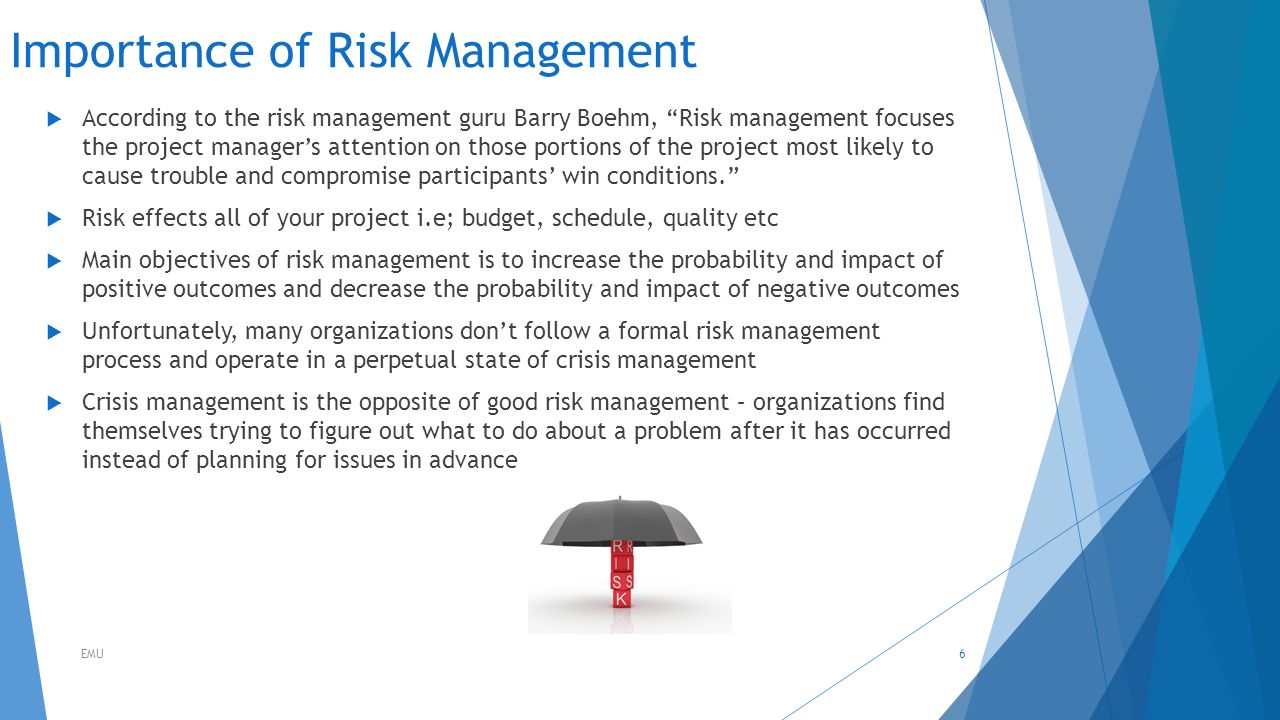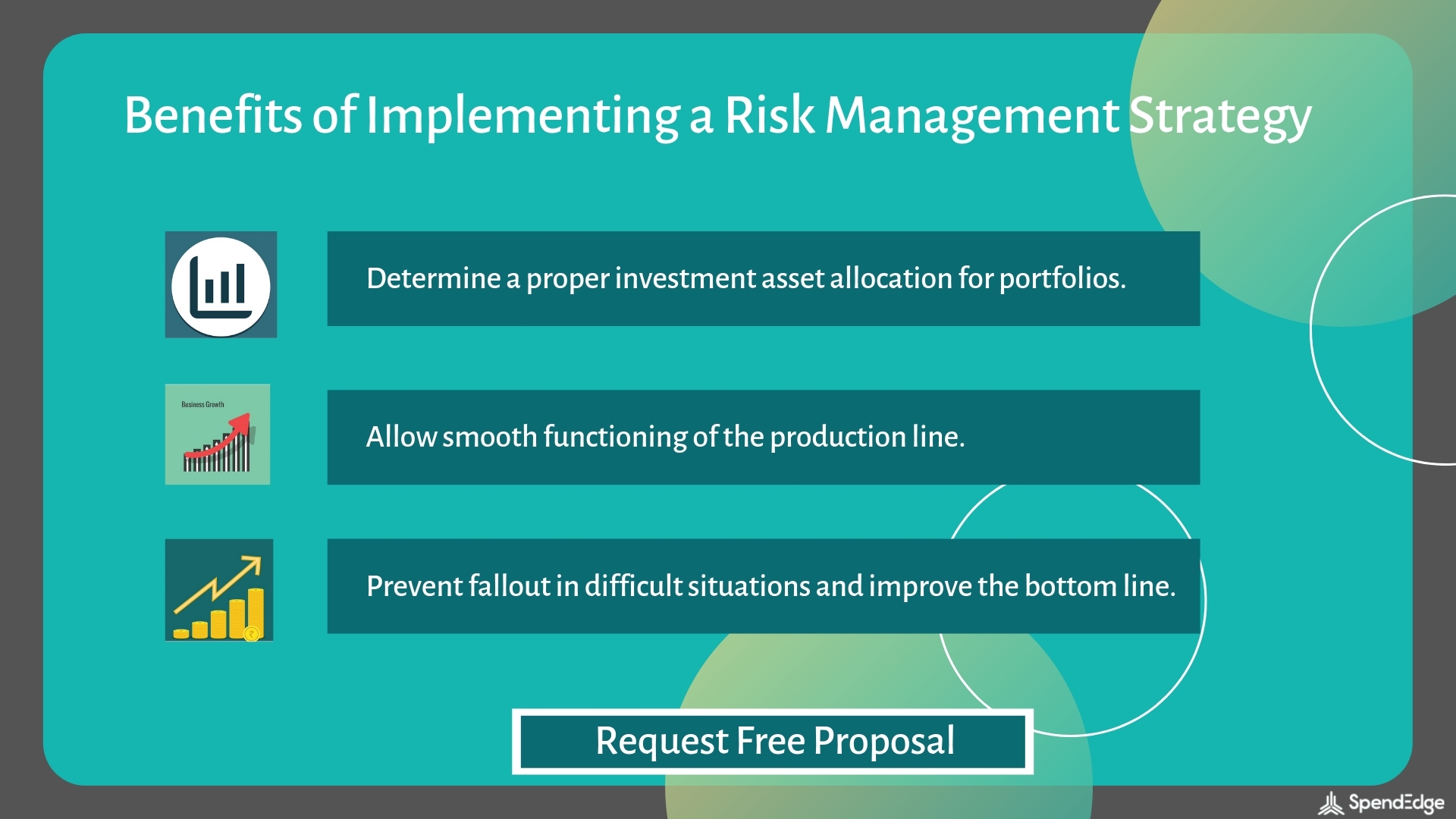The Effect of the Importance of Risk Management on Business Governance
The Effect of the Importance of Risk Management on Business Governance
Blog Article
Discovering the Relevance of Risk Management for Effective Decision-Making Techniques
In the intricate globe of business, Risk Management arises as a crucial aspect in the decision-making process. The capacity to determine possible dangers and possibilities, and strategize appropriately, can lead to the distinction between success and failure.
Understanding the Principle of Risk Management
Risk Management, a vital part in decision-making, is frequently misinterpreted or oversimplified. Normally, it refers to the identification, assessment, and prioritization of risks to decrease, keep an eye on, and control the likelihood or impact of unfavorable events. Nevertheless, it's not simply about protecting against adverse outcomes, however also regarding identifying prospective opportunities. Risk Management includes self-displined and organized methods, utilizing data and informative evaluations. It calls for a thorough understanding of the organization's context, goals, and the potential dangers that can obstruct them. From economic uncertainties, lawful responsibilities, calculated Management mistakes, to crashes and natural disasters, it attends to numerous threats. Importantly, efficient Risk Management is not stationary; it's a constant, positive procedure that advances with altering circumstances.
The Role of Risk Management in Decision-Making Processes
In the realm of critical planning and business operations, Risk Management plays an important duty in decision-making procedures. Risk Management thus comes to be a crucial tool in decision-making, assisting leaders to make informed choices based on a detailed understanding of the threats entailed. Risk Management serves as a crucial element in the decision-making procedures of any kind of company.

How Risk Management Boosts Strategic Preparation
In the context of strategic preparation, Risk Management plays an essential function. Initiating with the identification of prospective threats, it even more prolongs to the execution of Risk reduction measures. The duty of Risk Management is not fixed but dynamic, as it requires continuous monitoring and adjusting of approaches.
Determining Potential Risks
:max_bytes(150000):strip_icc()/operational_risk.asp-Final-4be32b4ee5c74958b22dfddd7262966f.png)
Executing Risk Mitigation
Risk mitigation techniques can vary from Risk avoidance, Risk transfer, to run the risk of decrease. Each method should be tailored to the specific Risk, considering its potential influence and the organization's Risk tolerance. Reliable Risk mitigation calls for a deep understanding of the Risk landscape and the potential impact of each Risk.
Tracking and Adjusting Approaches
Though Risk reduction is an important action in critical preparation, constant surveillance and adjustment of these methods is just as vital. This recurring process enables organizations to recognize new dangers and reassess existing ones, guaranteeing visit the site the applied techniques remain reliable in the ever-changing service setting. It likewise gives a possibility to examine the success of the Risk Management measures, allowing modifications to be made where needed, further enhancing strategic planning. Reliable monitoring and adjustment call for making use of analytics and crucial performance indications (KPIs) to gauge efficiency. These tools provide useful data-driven understandings that can notify calculated decision-making. Tracking and adjusting Risk Management methods is a vital part for enhancing a company's resilience and calculated preparation.
Instance Studies: Effective Risk Management and Decision-Making
In the globe of service and finance, successful Risk Management and decision-making often offer as the pillars of flourishing enterprises. These instances highlight the value of sharp Risk Management in decision-making procedures. These instances highlight the crucial function of Risk Management in tactical decision-making.
Devices and Techniques for Efficient Risk Management
Browsing the elaborate maze of Risk Management requires the best collection of methods and devices. These tools, such as Risk registers and warmth imp source maps, aid in identifying and examining possible dangers. Techniques include both quantitative methods, like level of sensitivity analysis, and qualitative approaches, such as SWOT evaluation. These assistance in focusing on risks based on their possible impact and likelihood. Risk response approaches, a key part of Risk Management, involve approving, preventing, transferring, or mitigating threats. Surveillance and regulating risks, via routine audits and testimonials, guarantee that the approaches remain effective. With these devices and strategies, decision-makers can navigate the complex landscape of Risk Management, thereby facilitating educated and reliable decision-making.
Future Trends in Risk Management and Decision-Making Techniques
As we discover the vast landscape of Risk Management, it becomes obvious that the strategies and devices utilized today will certainly remain to advance. Future patterns point in the direction of an enhanced dependence on modern technology, with artificial knowledge and artificial intelligence playing significant duties. These technologies will allow organizations to anticipate possible risks with higher precision and make more informed choices. Furthermore, there will be a growing emphasis on resilience, not simply in taking care of dangers however additionally in getting better from unfavorable situations. The principle of Risk culture, where every participant of a company is mindful and entailed in Risk Management, will acquire more importance. These trends herald an even more aggressive and inclusive method towards Risk Management and decision-making.
Final thought

Risk Management therefore becomes a crucial tool in decision-making, assisting leaders to make informed choices based on a detailed understanding of the dangers involved. Risk mitigation techniques can look at here range from Risk avoidance, Risk transfer, to risk reduction (importance of risk management). Efficient Risk mitigation calls for a deep understanding of the Risk landscape and the potential impact of each Risk. Risk reaction strategies, an essential part of Risk Management, entail accepting, staying clear of, moving, or mitigating risks. The idea of Risk culture, where every participant of an organization is aware and included in Risk Management, will obtain extra prestige
Report this page